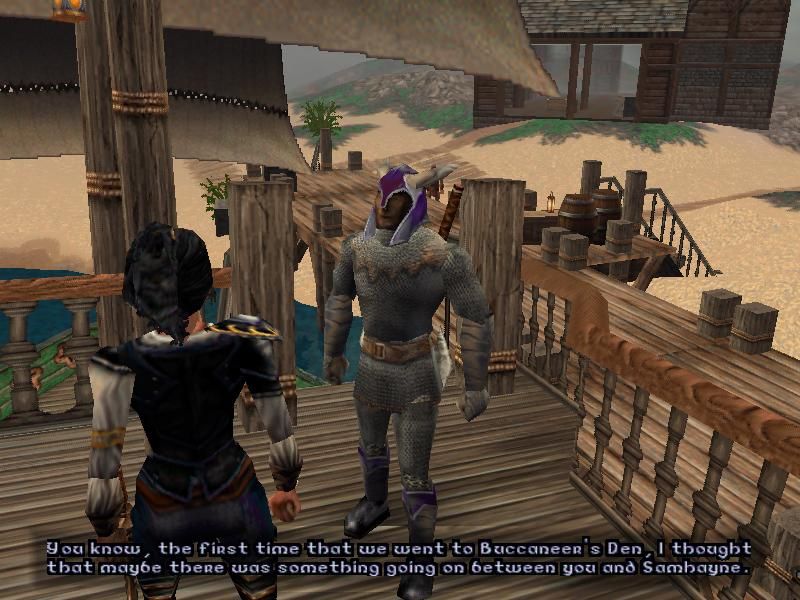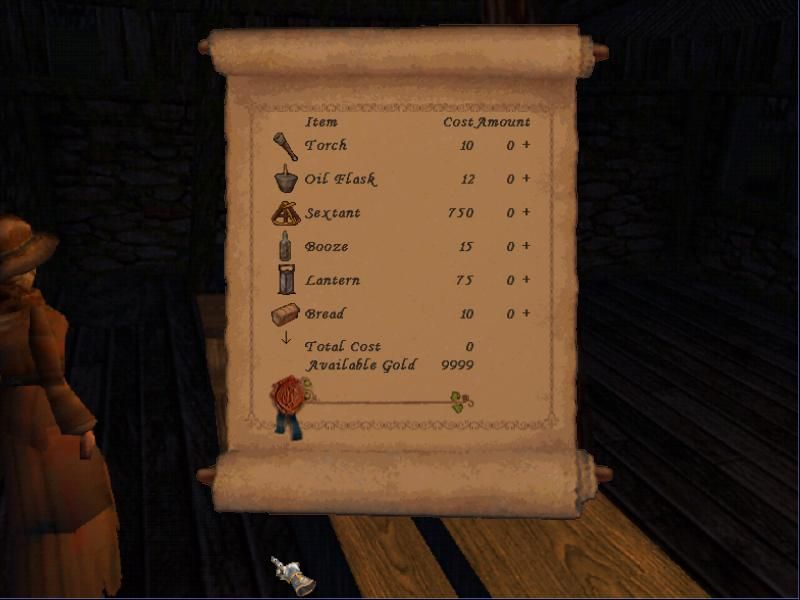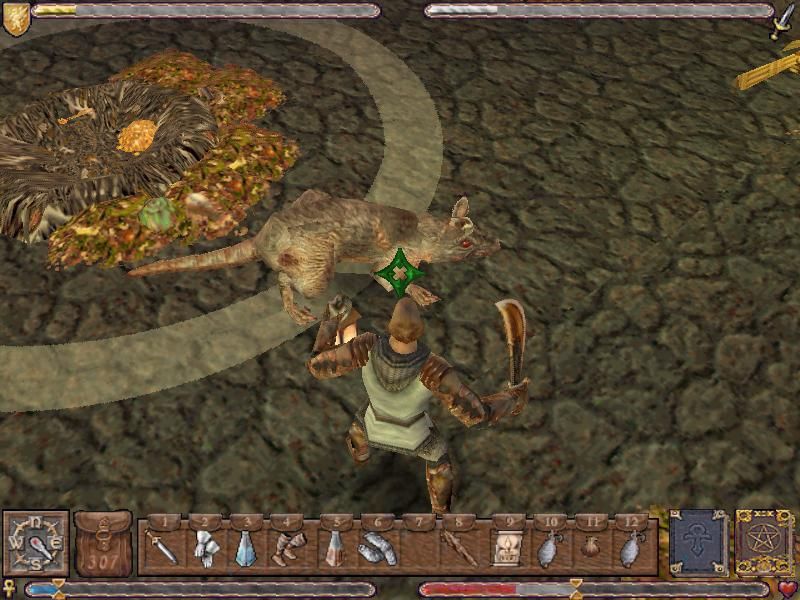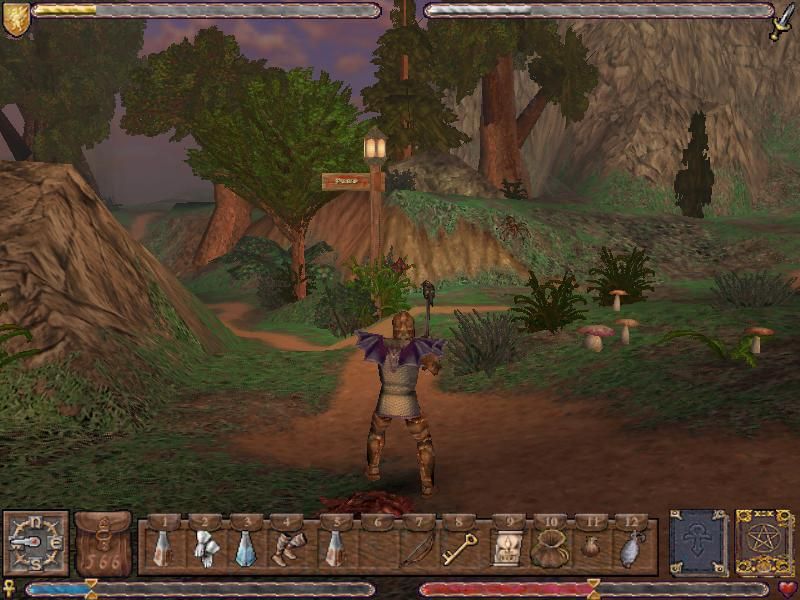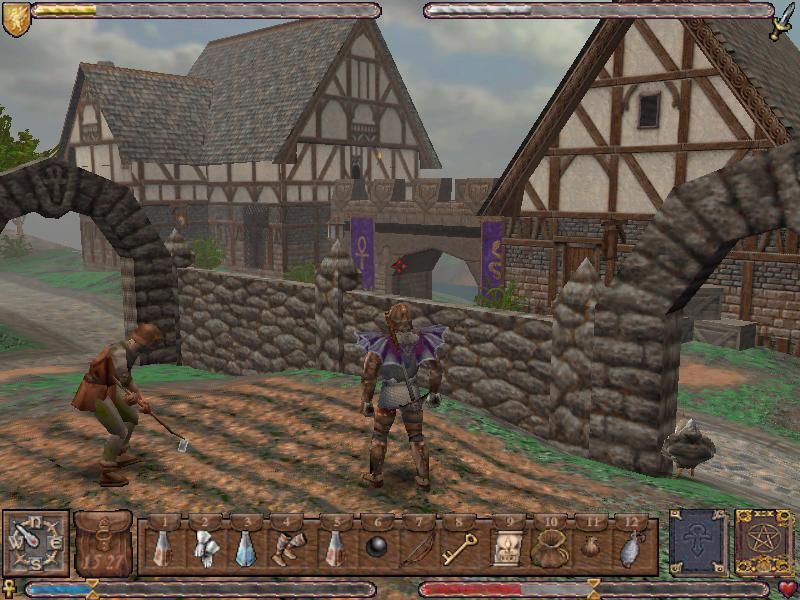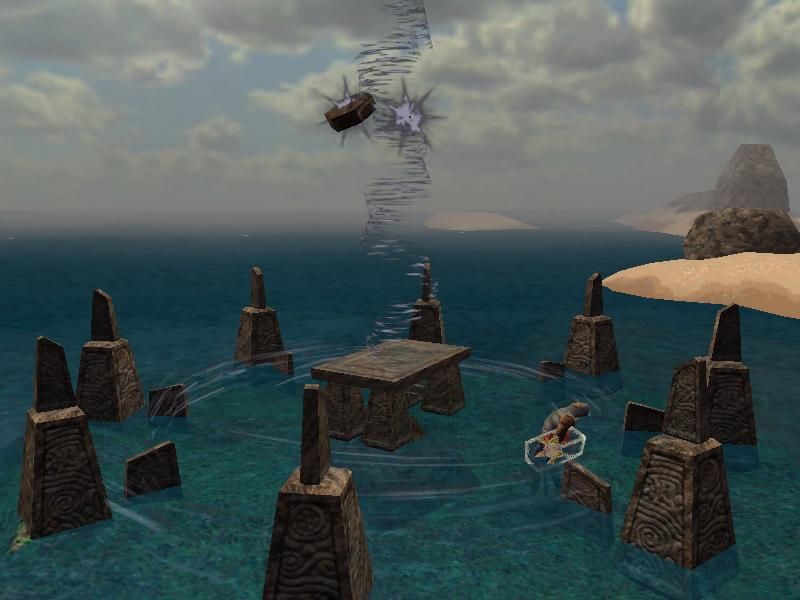Game Review: Ultima IX: Ascension
Geek specs:
| Title: | Ultima IX: Ascension |
| Platform: | PC |
| Genre: | RPG/Action/Adventure |
| Developer: | Origin Systems |
| Publisher: | Electronic Arts |
| Release: | 1999 |
Required System Specs
Minimum (minimum graphical detail):
Pentium II 266 MMX MHz Processor (or compatible)
600 GB Hard Drive
8 MB Video Card
64 MB RAM
Warning: this are the Min. Requirements written on the box but they are really not enough to run the game, even at the worst quality!
Supported Operating Systems:
Windows XP/2000/ME/98/95
Ultima 9 requires DirectX 7.0. Video card libraries supported: Direct3D and Glide
Introduction: Western RPGs are well known to be games without a story, without a true sense, with only a focus on buliding up your character to be more and more powerful and to be able to fight monsters of a great difficulty. The saga of Ultima, since it's first beginnings in the "ancient age" of videogames, has always tried to introduce a good story in this kind of game, still mantaining a western style. Thanks to Richard Garriot, one of the most important game developers in videogame history, the saga of Ultima evolved more and more to become one of the greatest RPGs ever. What has always counted in the saga of Ultima is the perfection of every bit of the game. This, the concluding game in the glorious series of Ultima, uses all the power of the modern computers to make a game that emerges from the others not so much for its story, but for the perfection and above all the mystical and magical atmosphere that pervades all the games.
Review: When you open the box of the game, you immediately notice the quality of the title you have in your hands: this is one of the last games to have a very well designed box, and inside you can find two manuals. One with the form of Avatar's journal that you have inside the game, where the commands, the bestiary and all the other things are explained. In the other manual, with the form of Avatar's spellbook, are explained the spells, what is needed to bind them, their effects, how to make potions and how to perform rituals. Furthermore, you can find in the game a beautiful map made of cloth and eight cards written in runic alphabet. To introduce you inside the game, the first thing to cover is the story. The story of Ultima 9 is very simple and it is connected to the ones of the previous chapters. Basically, Avatar is a common man of our earth, who, one day, discovers a mysterious gate. Some kind of blue door in the center of a circle of eight stones. Through this gate he travels to another dimension, or better, he travels to another planet in the universe, a little planet called Britannia, where magic exists and the world is still at a medieval stage
In each Ultima, Avatar travels to Britannia to save it from something, then he returns to his homeland, until, eventually, he will return to Britannia to save it again. The game is divided in three trilogies, referred to as the ages of Britannia: the Dark Age, the Enlightment Age, and the Guardian Age. Ultima 9 is the last chapter of Ultima and, of course, the last of the Guardian Age. In this chapter of the saga, Avatar will have to defeat the Guardian, a terrible demon that he couldn't defeat in Ultima 7, once and for all, knowing since the beginning of the adventure that this will be his last journey to Britannia. To do this, he must clean the eight shrines scattered throughout the land, each one associated to a virtue of Avatar and to a city associated to that virtue: Compassion, Humility, Honesty, Justice, Sacrifice, Honor, Valor and Spirituality. He must find the rune of each virtue, the mantra and the sigil, in order to clean the shrine. Then, he will have to fight the guardian once and for all. It seems like a large job, but it isn't. The game is easy and it is very linear, although you actually have all the freedom that you want to move around the world, to do whatever you want and to discover lots of lost places in the lands of Britannia: snowy mountains, little islands, ruins lost in the middle of a grassland, and lots more.
All cured in the minimal details: from the leaves of the trees to the stones in the forest, from the baker's shop in Britannia to the weapons store in Trinsic, from the clothes of the people to their tools to work, from their beds to the throne of the King, almost everything has it's own textures, and nothing is 2D. Another spectacular aspect of the game is the night/day cycle, in which you can follow the route of the sun from east to west and even the mooncycle of the two moons in the sky, Trammel and Felucca. All the power of the modern computers is used to the maximum possible, so much that, although this title was relased in 1999, many computers still have problems running it nowadays. This is because the world is not divided in to levels, it is only a massive 3D scene comprising everything: towns, seas, dungeons and wilderness, etc. Also, everything is filtered using 16-bit textures with a complex mip-map (obviously you can reduce the quality to let the game become faster but running the game with all the effects turned on is a wonderful experience).
The sound is worthy of the graphics: it supports the EAX extensions, giving a pure 3D sensation even with only two speakers. Also, every person in the game, from the King to the less important farmer, has voiceovers! That means, everyone has lots of things to tell you. The musical scores are also full of atmosphere and they are always fitting in the game.
And what to say about the gameplay? Everything is easy to use, thanks to a combined utilization of both mouse and keyboard. You have a comfortable toolbelt on the bottom of the screen that can contain 10 items that you can quickly use with the F1, F2, F3, and so on keys. The other items are stored in the backpack. The stats are not difficult to manage in the game: there are only three statistics (out of HP and MP), each one associated to the three principles that make the eight virtues (Love, Truth, and Courage). The stats are Dexterity, Magic power, and Strength. Each time you clean a shrine, you can power up one of the three statistics, so that, when you go for the last fight against the Guardian, you will eventually have all the statistics at their maximum.
The magic system is also very particular and fascinating, worthy of an explanation. When you begin your game, you will obtain an empty spellbook: the further you proceed in the game, you can store there the spells that you learn, or better, bind them so you can use them later in the game with your mana (MP). In order to bind them, you must have a scroll with the magic spell written on it (you can use these scrolls to cast magic without using any mana but you can only use them once), and some reagents are needed to bind them, depending on the spell; in the world of Britannia you can find some reagents (Garlic, Ginseng, Nightshade, Blackpearl, Bloody Moss, Mandrake Root). Once you have the scroll and the reagents you must put them on a pentagram (you can find pentagrams in the cities, in the dungeons and in all the important places in the land), then light the candles around it and speak the magic words associated with the spell. Everything is very detailed, but you never risk to feel lost, as I said before.
In the beginning of the game every command is explained and if there's something new to explain, there will surely be some character ready to discuss it with you. Also, although the story may not seem very fascinating, it's really well done and it evolves more and more as you proceed in the game, with lots of new characters, places and new things to discover. However, the most important thing is that you can feel the world alive around you, something that has always charaterized the Ultima series. The people who move, walk, who does their work and speaks independently from what you do. Not to mention the great mystical atmosphere that you feel around you. Something difficult to explain unless you play the game, made thanks to a wise use of graphics and sound fused together in one thing that has no name other than atmosphere.
Conclusion: Of course you can't expect from this game a story like the ones of Final Fantasy's. This doesn't come close to them, but it's still a good and enjoyable story, worthy of the last chapter of a saga that played an important role in all of videogame history. This is surely an enjoyable game for everyone, thanks to its rather good story, a huge world all to explore in all of its particulars, and its not very hard difficulty. Thinking and thinking, I have yet to find a true defect in this game.
Ratings: (scale of 0.0 - 5.0)
| Gameplay: 5.0 | Graphics: 5.0 |
| The game is very easy to manage and you'll surely have no problems in using the interface, thanks to a very comfortable use of hotkeys and shortcuts. | Graphics are really well done in this game. The light system is fantastic, and the game, although it was released in 1999, uses a lot of effects and a giant number of textures. |
| Sound: 4.5 | Overall: 5.0 |
| Sound is really well done in all of its parts, especially SFXs. The music is also well orchestrated with a new theme for the series and with some remakes of the scores of the old Ultimas, such as "Stones". | A game that shouldn't be missing from the collection of a true RPG lover, along with the Final Fantasy games. This game can let you inside a world that you can feel live around you, that can really immerse you inside your character, not using feelings, like Final Fantasy does, but with the atmosphere, the details. I have really appreciated this game that will always remain in the list of my favourite games and I am completely confident that there's no one in the world that can not like this game; The last of a series that made the history of videogames. person can really enjoy. |




